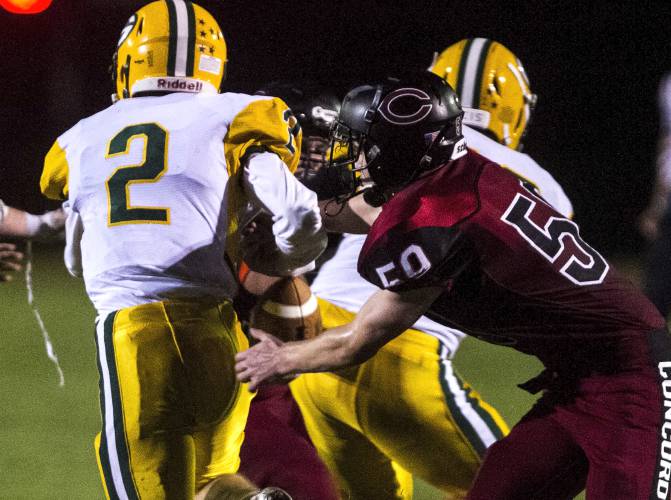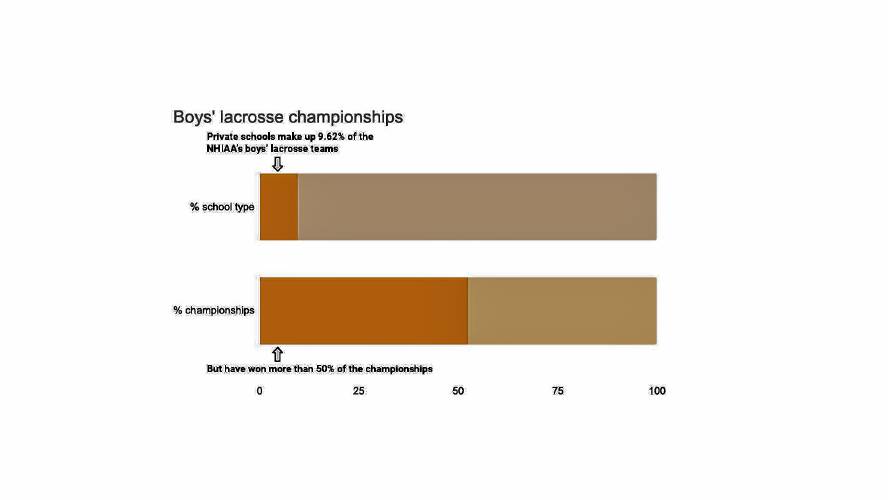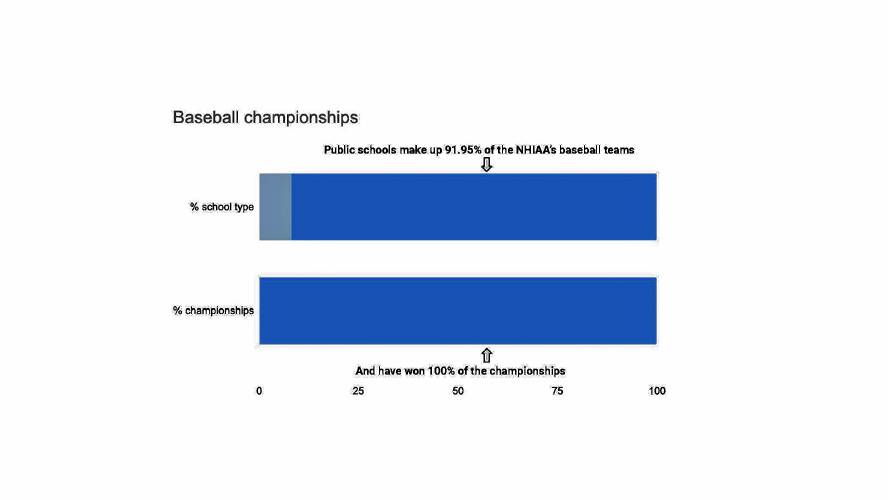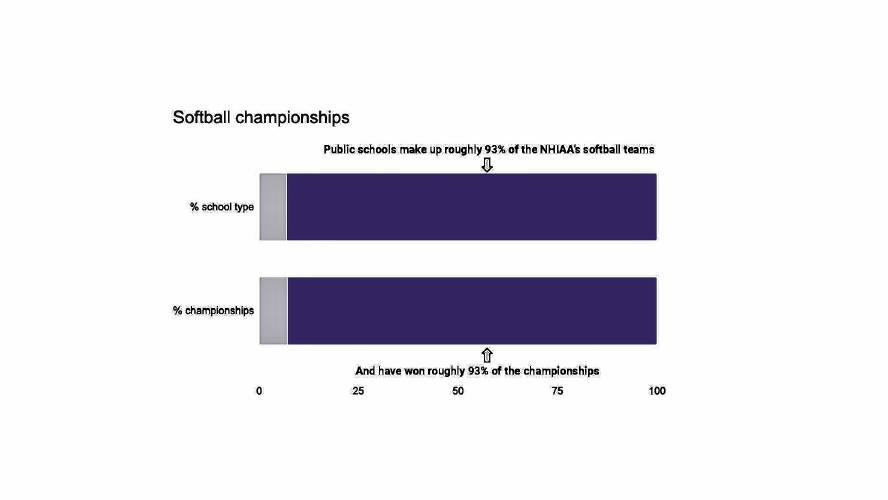Monitor analysis: Who wins more high school championships, public or private schools?
|
Published: 03-29-2024 1:55 PM
Modified: 03-31-2024 7:54 PM |
Earlier this month, the Concord Christian Academy girls’ varsity basketball team took home the Division II state championship — the program's third title in three different divisions in the last three years.
The team has moved up into divisions with larger schools in an attempt to find stronger competition for its talented roster. Next year, CCA will compete at the Division I level.
Private schools, like Concord Christian, can accept students from anywhere in the state, while public schools can only accept students who live in a certain geographic area. That’s led some to argue that difference provides a competitive advantage in high school sports.
While some private schools win an outsized percentage of championships in certain sports like lacrosse, not all private schools are as successful in raking in state championships. In other sports, public schools consistently come out on top of state championships as well, according to a Concord Monitor analysis of roughly eight years of data across multiple sports.
Among the 89 high schools that are part of the New Hampshire Interscholastic Athletic Association, nine are private schools. That’s just over 10%. As such, private schools winning roughly 10% of the state championships would suggest a relatively level playing field. Since the 2016-17 school year, private schools have won just under 14% of state titles in major sports (football, soccer, field hockey, volleyball, basketball, ice hockey, baseball, softball and lacrosse). That’s a slight difference, but far from dominance.
Not all private schools — or public schools for that matter — field teams for every sport. Football and ice hockey, for example, are a bit less common. In some sports, private schools have won a larger share of state titles than would be expected, most notably in boys’ lacrosse. Of the five private schools among the 52 (9.6%) that have boys’ lacrosse programs, private schools have claimed more than half of the championships. Bishop Guertin and Derryfield, two private schools, have each won five titles apiece.
A similar trend can be seen in girls’ lacrosse, where private schools account for 11.5% of the teams but have won just under 24% of the titles and in girls’ basketball, where private schools account for 10.1% of the teams but 31% of the titles. Again, though, that success is mostly consolidated by two schools: Bishop Guertin, which has six girls’ basketball titles and four in girls’ lacrosse and Concord Christian, which has the three girls’ basketball titles.
Public schools have claimed their stake of dominance over particular sports as well. Bedford has won four football and volleyball championships, three in boys’ hockey and two in boys’ soccer; Campbell has won three boys’ soccer titles; Exeter has won multiple titles across girls’ soccer, field hockey, baseball and softball; Hanover has won six girls’ hockey titles; Hopkinton has won four in girls’ soccer, four in boys’ lacrosse and two in girls’ lacrosse; Portsmouth has won three boys’ basketball titles and five in girls’ lacrosse; Pelham has won four in football. The list goes on.
Article continues after...
Yesterday's Most Read Articles
 Bill to allow ‘no fault’ evictions makes it to governor’s desk
Bill to allow ‘no fault’ evictions makes it to governor’s desk
 ‘He’s coming home’: Jury acquits former prison guard Matthew Millar in murder trial
‘He’s coming home’: Jury acquits former prison guard Matthew Millar in murder trial
 Look, up in the sky! It’s… an Airstream trailer?
Look, up in the sky! It’s… an Airstream trailer?
 Around Concord: Living in an 1856 schoolhouse is (mostly) delightful
Around Concord: Living in an 1856 schoolhouse is (mostly) delightful
 Slots and no bet limits: State budget shakes up New Hampshire’s casino landscape
Slots and no bet limits: State budget shakes up New Hampshire’s casino landscape
 ‘Deep flavor’ – New restaurant in downtown Concord offers creative spin on comfort food and cocktails
‘Deep flavor’ – New restaurant in downtown Concord offers creative spin on comfort food and cocktails
The bottom line is that, for the most part, private schools don’t take home a disproportionate number of state championships, relative to the number of schools participating in each sport.
A clearer indicator of championship success, however, is the median income level of a community. In other words, the more wealth in a community — and the more resources to go toward education and extracurricular activities — the better the sports teams tend to fare.
Thirty-eight of the 79 New Hampshire public schools and academies (excluding nine private schools and Canaan, which straddles the border with Vermont) are in communities with a median family income over $100,000; those schools have won 197 championships.
The 41 other schools in communities with a median family income under $100,000 have won 93 championships, less than half as many.
For a full look at the data, click here.











 Sunapee’s Bryce Whitlow keeps memory of above-average MLB players alive through social media page ‘MLB Hall of (Pretty) Good’
Sunapee’s Bryce Whitlow keeps memory of above-average MLB players alive through social media page ‘MLB Hall of (Pretty) Good’ Six local seniors play in CHaD East-West All-Star Football game; Nyhan wins MVP
Six local seniors play in CHaD East-West All-Star Football game; Nyhan wins MVP Concord Monitor Spring Players of the Season
Concord Monitor Spring Players of the Season Athlete of the Week: Nate Kiah, Bow Falcons
Athlete of the Week: Nate Kiah, Bow Falcons
